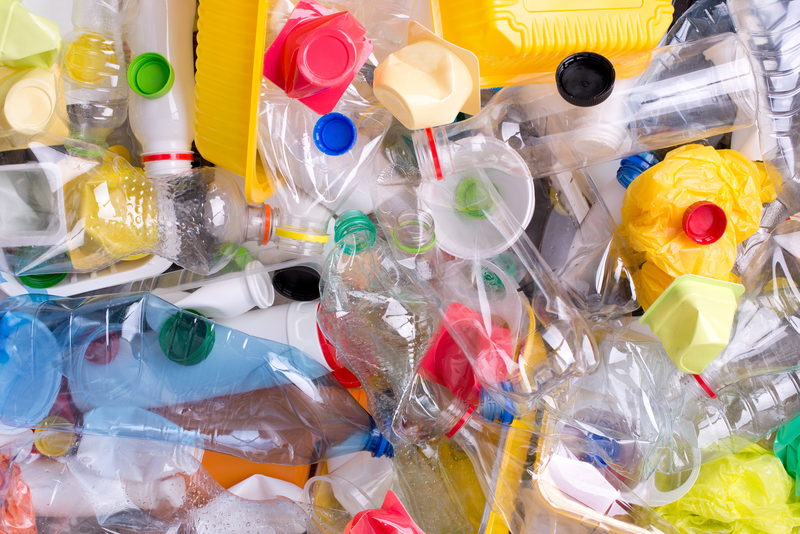Inspiring Young Minds with the Magic of Recycling: Why It Matters
Recycling is more than just a process--it's a powerful movement that shapes the future of our planet. When we introduce children to the wonders and benefits of recycling, we're cultivating generations who understand sustainability, responsibility, and creativity. In this comprehensive guide, we'll explore the best ways to inspire young minds with the magic of recycling, highlight its many benefits, and provide practical ideas for parents, educators, and communities to foster ecological consciousness in their children.

The Importance of Teaching Children about Recycling
Teaching the art and science of recycling from a young age is essential for creating environmentally responsible citizens. By harnessing recycling's magic, we can tap into kids' innate curiosity and encourage lifelong eco-friendly habits. Below, we'll uncover why introducing the recycling process to young minds is crucial.
Key Benefits of Recycling for Children
- Educational Growth: Recycling teaches kids about science, the environment, and how their actions impact the world.
- Creative Development: Repurposing materials can unlock children's creativity and problem-solving skills.
- Social Responsibility: Early education in sustainability fosters a sense of responsibility and stewardship for the Earth.
- Future Leadership: Inspired children often become environmental advocates and leaders in their communities.
Why Start Early?
Children are naturally curious and eager to learn. Early exposure to recycling initiatives, eco-friendly behaviors, and hands-on activities can create a lasting foundation for sustainable living. Cultivating these habits while they're young empowers children to make a real difference in their world.
Fun Ways to Inspire Kids with Recycling
1. Make Recycling a Magical Adventure
Kids love stories, adventures, and challenges! Turn recycling into a magical journey by:
- Introducing them to "recycling heroes"--cartoon characters or real-life figures who save the world by recycling.
- Creating scavenger hunts where the goal is to find recyclables around the house or classroom.
- Sharing before-and-after stories about how recycled materials become new products.
2. Hands-On Recycling Crafts and Projects
Imagination knows no bounds when kids transform trash into treasure! Here are a few recycling activities guaranteed to captivate and educate:
- DIY Bird Feeders: Use empty plastic bottles and containers to build bird feeders that benefit wildlife.
- Tin Can Planters: Decorate old cans and use them for growing seeds or houseplants. It's a lesson in recycling and gardening--two sustainability practices in one!
- Cardboard Box Creations: Build castles, rockets, and other imaginative structures out of old boxes, teaching kids that reuse can be as fun as it is important.
- Recycled Art: Organize art contests using only materials destined for recycling bins to showcase the beauty of upcycling.
3. Engaging Kids with Recycling Games
Learning through play is exceptionally effective. Consider these interactive recycling game ideas:
- Recycle Sorting Races: See who can sort household waste into the right bins the fastest.
- Eco-Quiz Time: Test kids' knowledge of recyclable materials with fun quizzes, flashcards, or online apps.
- Community Clean-up Competitions: Encourage friendly competition and teamwork in local parks or beaches.
Integrating Recycling into School Curriculums
Schools play a vital role in inspiring young minds through recycling education. Integrating recycling into daily lessons, science projects, and extracurricular activities ensures a comprehensive and interactive approach.
Tips for Educators
- Design Recycling Lesson Plans: Incorporate sustainability topics into math, science, art, and language subjects.
- Classroom Recycling Bins: Place well-labeled bins in classrooms and reward consistent efforts through recognition programs.
- Eco Clubs: Establish school clubs dedicated to recycling, composting, and environmental stewardship.
- Field Trips: Tour recycling centers to provide first-hand insights into waste management and material recovery.
- Guest Speakers: Invite environmental experts, local recyclers, or green entrepreneurs to share their stories with students.
Motivating Young Environmental Stewards at Home
Parental involvement is key for long-term eco-friendly habits. Children learn by example, so making recycling a family effort reinforces its importance and turns every day into a learning opportunity.
Family Recycling Strategies
- Visible Recycling Stations: Set up convenient bins for paper, plastics, glass, and cans in the kitchen.
- Recycling Rewards: Give positive reinforcement or small rewards for diligent recycling.
- Discuss the "Why": Talk openly about how recycling helps animals, people, and the planet.
- Packing School Lunches Sustainably: Involve your child in preparing snacks and meals with reusable containers and minimal single-use packaging.
Innovative Ways Communities Can Foster Recycling in Young People
Local communities have a profound influence in encouraging the wonders of recycling among children. Through neighborhood programs, public spaces, and media campaigns, innovative solutions can inspire collective action and cultivate eco-friendly values from an early age.
Community-Focused Ideas
- Public Art Installations: Showcase giant sculptures or murals made from recycled materials, igniting curiosity and appreciation.
- Library Reading Hours: Host events featuring environmental stories and "green" activities for children.
- School Partnerships: Work with local schools to coordinate city-wide recycling drives and environmental fairs.
- Recycling Centers for Kids: Offer tours and workshops tailored to make the recycling process accessible and inspiring for families.
- Community Gardens: Create gardens that use compost generated by community-wide recycling efforts, connecting the dots between waste reduction and environmental health.
The Science Behind Recycling: A Child-Friendly Explanation
Taking the mystery out of recycling helps children understand the bigger picture. Here's a simple, age-appropriate way to explain how recycling transforms trash into new treasure:
- Step 1 - Collection: Recycling begins when we separate bottles, cans, paper, and boxes from other waste at home or school.
- Step 2 - Transportation: Trucks bring these materials to special recycling centers.
- Step 3 - Sorting: Machines and workers organize materials into similar groups (plastic bottles with other plastics, paper with paper, etc.).
- Step 4 - Cleaning: The sorted recycled items get washed and prepared for rebirth.
- Step 5 - Reprocessing: Factories melt, shred, or break down the recycled items to make new products--for example, a soda bottle may become a new jacket or a playground bench.
This magical transformation shows children the endless possibilities recycling offers. The things we use today can become something new and helpful tomorrow!
Common Recycling Myths - Debunking for Kids
Some kids (and adults!) might have misconceptions about recycling. Let's clarify with kid-friendly explanations:
- Myth: "One person can't make a difference."
Fact: Every plastic bottle recycled saves energy and reduces pollution. When everyone pitches in, big changes happen! - Myth: "All trash goes to the same place."
Fact: Recyclables are sent to special places where they become new things. Sorting is important! - Myth: "It's too hard to recycle."
Fact: With color-coded bins and clear instructions, recycling is easy and fun for everyone!
Recycling and Creativity: Building Tomorrow's Innovators
By blending recycling education with creative challenges, we empower children to become innovators who can solve tomorrow's problems. Whether designing new products from used materials or dreaming up ways to reduce waste, recycling's magic is a powerful catalyst for invention and ingenuity.
Encouraging Eco-Innovation in Kids
- Host "invention days" where children tinker with clean recyclables to invent useful gadgets or art.
- Celebrate kids who come up with new ways to reduce, reuse, and recycle at school or in the neighborhood.
- Connect recycling with STEM (Science, Technology, Engineering, Math) learning by building simple machines or structures from recycled parts.
Inspiring Young Minds with Recycling Success Stories
Real-life stories can deeply motivate children! Share tales of young environmentalists and inventors who started making a difference early:
- Ryan Hickman: As a young boy, Ryan founded "Ryan's Recycling," helping his community recycle hundreds of thousands of bottles and cans.
- Ann Makosinski: Inspired by upcycling, Ann invented an award-winning flashlight powered by body heat, using recycled components.
- Community Youth Projects: Highlight local school or scout projects that transformed plastic waste into playgrounds, classrooms, or art installations.
Reading and discussing these stories builds belief in every child's power to enact change through simple, everyday actions.

How to Keep Recycling Exciting for Kids
To maintain enthusiasm and interest in recycling among children, variety and recognition matter. Try these strategies:
- Rotate activities monthly to keep recycling fresh and engaging.
- Award "Eco-Star" badges or certificates for consistent recyclers.
- Share progress charts so kids can visualize how much they're saving or reusing.
- Invite children's ideas for new projects and competitions to fuel their sense of ownership.
Conclusion: Unleashing the Magic of Recycling for Every Child
Each day presents a new opportunity to inspire young minds with the magic of recycling. It isn't just about reducing waste--it's about empowering kids to love their planet, value creativity, and grow into responsible leaders for a sustainable future. By weaving imaginative activities, hands-on projects, and community collaboration into our approach, we make recycling a source of empowerment and excitement for every child.
Together, let's nurture a world where recycling is second nature--and where every child's journey toward sustainability begins with a spark of inspiration.
Frequently Asked Questions (FAQ) for Parents and Educators
- Q: How young should kids start learning about recycling?
A: It's never too early! Toddlers can start by identifying colors of recycling bins; older kids can participate in sorting and creative projects. - Q: What materials are easiest for children to recycle?
A: Paper, cardboard, plastic bottles (with supervision), and aluminum cans are great starting points. Always ensure items are clean and safe for handling. - Q: How can schools get more involved with recycling education?
A: Schools can partner with local recyclers, launch eco-clubs, and integrate sustainability into various subjects for a well-rounded approach. - Q: How do I explain the importance of recycling to a child who isn't interested?
A: Share real-world stories of invention and environmental impact, and use games or art to engage their imagination.
Let's keep the magic of recycling alive in every home, school, and community--inspiring the next generation for a brighter tomorrow!